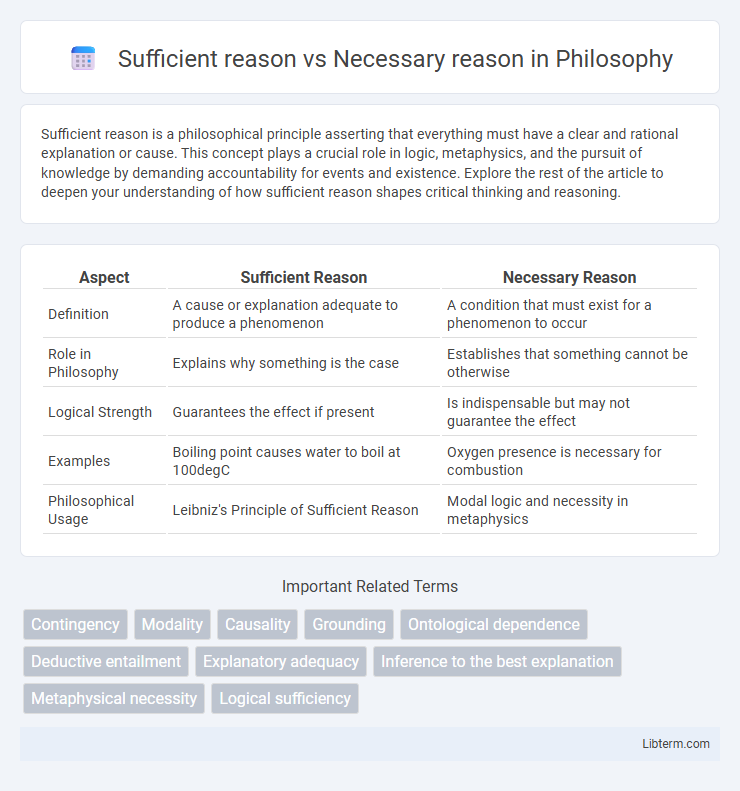Sufficient reason is a philosophical principle asserting that everything must have a clear and rational explanation or cause. This concept plays a crucial role in logic, metaphysics, and the pursuit of knowledge by demanding accountability for events and existence. Explore the rest of the article to deepen your understanding of how sufficient reason shapes critical thinking and reasoning.
Table of Comparison
| Aspect | Sufficient Reason | Necessary Reason |
|---|---|---|
| Definition | A cause or explanation adequate to produce a phenomenon | A condition that must exist for a phenomenon to occur |
| Role in Philosophy | Explains why something is the case | Establishes that something cannot be otherwise |
| Logical Strength | Guarantees the effect if present | Is indispensable but may not guarantee the effect |
| Examples | Boiling point causes water to boil at 100degC | Oxygen presence is necessary for combustion |
| Philosophical Usage | Leibniz's Principle of Sufficient Reason | Modal logic and necessity in metaphysics |
Understanding Sufficient and Necessary Reasons
A sufficient reason guarantees the truth of a proposition, meaning if the reason exists, the proposition must be true. A necessary reason indicates a condition that must be met for the proposition to hold, but alone may not guarantee its truth. Understanding the distinction helps clarify logical relationships and strengthens argumentation by identifying whether a reason alone is adequate or merely required.
Defining Sufficient Reason
A sufficient reason is a condition or set of conditions that guarantees the occurrence or truth of an event or proposition, providing complete explanation without the need for further justification. It differs from a necessary reason, which is a condition that must be present for an event to occur but alone may not be enough to cause it. Understanding sufficient reasons is crucial in logic, philosophy, and science to establish causality and validate arguments.
Defining Necessary Reason
A necessary reason is a condition or cause that must be present for an event or proposition to occur, implying its indispensability in the causal chain. It contrasts with a sufficient reason, which guarantees the event but is not required for it to happen. In epistemology and metaphysics, necessary reasons establish indispensable grounds that cannot be omitted without altering the outcome or truth of the statement.
Key Differences Between Sufficient and Necessary Reasons
A sufficient reason guarantees the truth or occurrence of an event, providing complete justification without the need for further explanation, whereas a necessary reason must be present for the event to happen but alone may not guarantee its occurrence. Key differences include that a sufficient reason ensures an outcome by itself, while a necessary reason is a prerequisite without which the outcome cannot occur. In logic and philosophy, understanding these distinctions clarifies causal relationships, highlighting that sufficiency establishes cause-effect certainty, whereas necessity indicates essential conditions.
Common Examples in Everyday Context
Sufficient reason describes a condition or factor that alone guarantees a specific outcome, such as turning on a light switch causing the light to illuminate. Necessary reason refers to a condition that must be present for an event to occur but alone may not produce the event, like oxygen being required for a fire to burn. In everyday contexts, having a ticket is a necessary reason to enter a concert, while the concert organizer's approval is a sufficient reason to grant access.
Application in Logic and Philosophy
Sufficient reason in logic and philosophy denotes a condition or set of conditions that guarantee the truth of a proposition, ensuring its validity within an argument. Necessary reason refers to a prerequisite condition that must be met for a proposition to be true, forming the foundational basis for logical inference and philosophical analysis. These concepts underpin modal logic, causal reasoning, and metaphysical discussions, guiding the evaluation of argument soundness and the structure of explanatory frameworks.
Real-World Implications in Decision Making
Sufficient reason ensures that an event or decision is fully supported by enough evidence or conditions, guaranteeing its occurrence, while necessary reason identifies essential factors without which the event cannot happen. In decision making, understanding sufficient reasons helps validate choices by confirming all critical criteria are met, whereas recognizing necessary reasons highlights indispensable elements that must be addressed. Real-world implications include improving strategic planning and risk management by distinguishing between what completely justifies an action and what fundamentally drives its possibility.
Pitfalls and Common Misconceptions
Sufficient reason refers to a condition or set of conditions that guarantee an event's occurrence, while necessary reason denotes a prerequisite without which the event cannot happen. A common pitfall is conflating necessary reasons with sufficient ones, leading to incorrect assumptions that merely meeting a necessary condition ensures the event's occurrence. Misunderstanding this distinction results in flawed causal analysis, where people mistakenly believe that satisfying necessary criteria alone provides comprehensive explanation or justification.
Sufficient vs Necessary: How to Distinguish
A sufficient reason guarantees the truth of a proposition, meaning if the sufficient reason holds, the proposition must be true, while a necessary reason must be true for the proposition to hold but alone may not guarantee its truth. Distinguishing between sufficient and necessary reasons involves assessing whether a condition alone can produce the outcome (sufficient) or if it is required as part of the conditions for the outcome (necessary). Understanding this distinction is critical in logic, philosophy, and legal reasoning for accurately establishing cause-and-effect relationships.
Conclusion: Importance in Critical Thinking
Sufficient reason refers to evidence that guarantees the truth of a conclusion, while necessary reason identifies conditions that must be present for an argument to hold. Understanding the distinction enhances critical thinking by enabling precise evaluation of arguments, distinguishing between what is merely required and what fully supports a claim. Mastery of these concepts ensures more effective reasoning, stronger argument construction, and improved decision-making skills.
Sufficient reason Infographic

 libterm.com
libterm.com